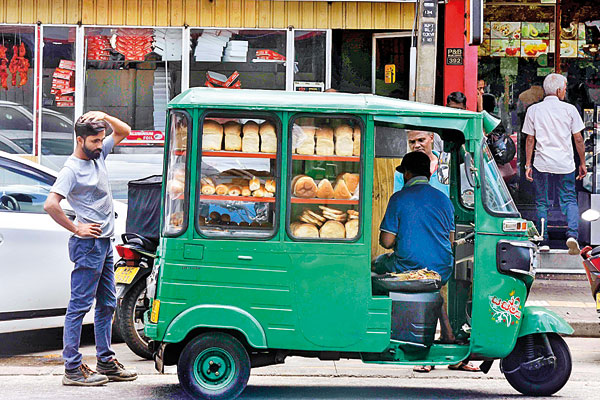News
Bread to be the consumer watchdog’s responsibility
View(s):By Kasun Warakapitiya
Laws related to bread are to be brought under the consumer products and services regulator.
The Trade Ministry said the archaic Bread Ordinance will be cancelled and laws and regulations related to the quality of bread will be brought under the Consumer Affairs Authority.
Trade Ministry Secretary, A.M.P.B Atapattu told the Sunday Times that there is no authority to implement the Ordinance.
Discussions have been held with stakeholders and a cabinet paper has been prepared to allow the CAA to implement the laws.

Pic by Akila Jayawardena
Mr. Atapattu said that product weights are regulated through Measurements, Units, Standards and Service Department, and hygiene is the responsibility of the Health Department. Inspections are done by public health officers. But both parties are not empowered to implement the Ordinance.
“The Bread Ordinance created in British times was standing alone without any authority to govern it. It was implemented through the magistracies, under their jurisdiction. The magistrate could authorise any police, or peace officer, or other person by warrant,” he said.
The Bread Ordinance of 1864 had provisions for the sale of bread by weight, and marking of the weight of loaves, offences relating to sale of bread, and means of weighing to be provided by every baker, or vendor of bread.
It had laws against adulteration of bread as well as penalties against adulteration of bread, and adulterating of cornmeal, or flour. Even fines ranging from Rs 50 to Rs 100 are stipulated. It even had provisions for searches of bakers’ premises and seizure of adulterated flour.
The director of the Measurements Unit, Standards and Services Department (Sri Lanka Scientific Service) S.N. Akuranthilaka said despite not having the authority, the weight of bread is checked according to provisions of the Measurement Unit, Standards and Services Act of 1995.
“According to clause 42 of the Act, the department can take action against persons selling goods that are below the designated weight. But, there are several varieties of bread at different prices and weights. Bakers try to avoid responsibility saying the bread we weigh are lower-priced ones,’’ he said.
“We carried out 700 raids on bakeries and advised them to maintain the proper weight of bread. We can’t take legal action according to the Bread Ordinance as we are not authorised. Even though we can only fine Rs 5,000 per person for selling products below the designated weight according to our Act, it is not enough.’’
The Trade Ministry has been asked to cancel the Ordinance and empower the Consumer Authority and the department.
The president of Public Health Inspectors Union, Upul Rohana said inspectors can take action against adulteration under the Food Act of 1980.
Inspectors check the hygiene at bakeries and their workers. The moisture content and mould are checked and samples can be sent to the Government Analyst Department to test for adulteration.
A CAA official who declined to be named, said it only regulates prices not quality.
The best way to say that you found the home of your dreams is by finding it on Hitad.lk. We have listings for apartments for sale or rent in Sri Lanka, no matter what locale you're looking for! Whether you live in Colombo, Galle, Kandy, Matara, Jaffna and more - we've got them all!

